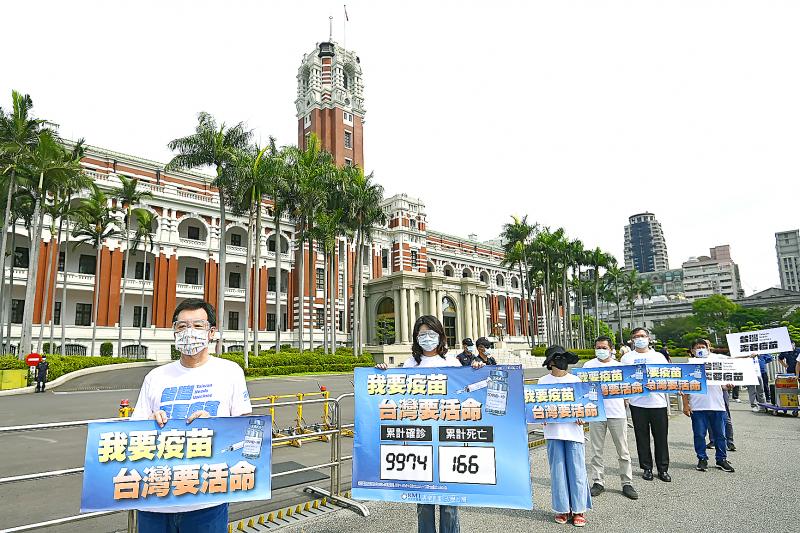The Chinese Nationalist Party (KMT) yesterday called on the public to launch nationwide protests against the government’s COVID-19 vaccine policy tomorrow.
People should protest at home by taking photographs of themselves holding up signs with the slogan “support healthcare workers, we want vaccines” and post them on Facebook under a hashtag for the protest.
Earlier yesterday, the KMT said that people should protest “wherever they are,” suggesting that people make noise in front of open windows at home, bang pots and pans, and turn off their lights for one minute at 8pm, as well as that people who are traveling in their vehicles should honk their horns.

Photo: Chen Chih-chu, Taipei Times
After medical workers said that this might disrupt their work, the KMT changed its protest call.
KMT Disciplinary Committee director Yeh Ching-yuan (葉慶元) in an online news conference accused the Ministry of Health and Welfare of contravening the law by demanding that Honhai Precision Industry Co (鴻海精密) founder Terry Gou (郭台銘) submit letters from BioNTech as part of his application to import COVID-19 vaccines from the German manufacturer.
The YongLin Charity and Education Foundation, a charity established by Gou, on Tuesday submitted its application for the importation of 5 million doses of the vaccine to the Food and Drug Administration.
Minister of Health and Welfare Chen Shih-chung (陳時中), who heads the Central Epidemic Command Center (CECC), on Thursday said that the foundation would additionally have to submit an original letter of authorization from the manufacturer.
Citing the Regulations for Approval of Specific Medical Products’ Manufacturing or Importing as a Special Case (特定藥物專案核准輸入及製造辦法), Yeh said that there is no legal requirement for the additional documentation or any other proof that a drug intended for import is available.
Requirements cited by the ministry cannot be found on its Web site, Yeh added.
In contrast with other entities, the CECC could import drugs and file the required paperwork up to half a year later, Yeh said, citing Article 51 of the Communicable Disease Control Act (傳染病防治法).
“All this talk of paperwork … is bogus,” Yeh said.
Chen is misinterpreting the law and making up requirements to prevent the importation of vaccines, he added.
KMT Chairman Johnny Chiang (江啟臣) said that even with Japan’s donation of 1.24 million doses of the AstraZeneca COVID-19 vaccine yesterday, Taiwan still needs more vaccines.
If Taiwan “opens its doors,” it would be able to obtain more vaccines quickly, Chiang said.
The donation from Japan shows that the administration of President Tsai Ing-wen (蔡英文) needs help to obtain doses from the private sector, the public and the international community, Chiang said, adding that the government’s planning on vaccine purchases is disorganized and has evidently failed.
The government has said that it stands with the people, and now it is time to live up to its words instead of blocking the importation of vaccines, citing “vaccine safety,” he said.
Taiwanese can “only shake their heads” in dismay over the government’s performance while people in the private sector are seeking ways to purchase vaccines, he said.
Separately, Democratic Progressive Party caucus secretary-general Lo Chih-cheng (羅致政) yesterday said that KMT lawmakers should “do their job in the legislature” instead of staging a protest under the “we want vaccines” banner in front of the Presidential Office Building in Taipei earlier that day.
Additional reporting by Jason Pan and CNA

Taiwan would welcome the return of Honduras as a diplomatic ally if its next president decides to make such a move, Minister of Foreign Affairs Lin Chia-lung (林佳龍) said yesterday. “Of course, we would welcome Honduras if they want to restore diplomatic ties with Taiwan after their elections,” Lin said at a meeting of the legislature’s Foreign Affairs and National Defense Committee, when asked to comment on statements made by two of the three Honduran presidential candidates during the presidential campaign in the Central American country. Taiwan is paying close attention to the region as a whole in the wake of a

President William Lai (賴清德) has appointed former vice president Chen Chien-jen (陳建仁) to attend the late Pope Francis’ funeral at the Vatican City on Saturday on his behalf, the Ministry of Foreign Affairs said today. The Holy See announced Francis’ funeral would take place on Saturday at 10am in St Peter’s Square. The ministry expressed condolences over Francis’ passing and said that Chen would represent Taiwan at the funeral and offer condolences in person. Taiwan and the Vatican have a long-standing and close diplomatic relationship, the ministry said. Both sides agreed to have Chen represent Taiwan at the funeral, given his Catholic identity and

Chinese Nationalist Party (KMT) Chairman Eric Chu (朱立倫), spokeswoman Yang Chih-yu (楊智伃) and Legislator Hsieh Lung-chieh (謝龍介) would be summoned by police for questioning for leading an illegal assembly on Thursday evening last week, Minister of the Interior Liu Shyh-fang (劉世芳) said today. The three KMT officials led an assembly outside the Taipei City Prosecutors’ Office, a restricted area where public assembly is not allowed, protesting the questioning of several KMT staff and searches of KMT headquarters and offices in a recall petition forgery case. Chu, Yang and Hsieh are all suspected of contravening the Assembly and Parade Act (集會遊行法) by holding

Lawmakers from the Democratic Progressive Party (DPP) yesterday established a friendship group with their counterparts in Ukraine to promote parliamentary exchanges between the two countries. A ceremony in Taipei for the Taiwan-Ukraine Parliamentary Friendship Association, initiated by DPP Legislator Chen Kuan-ting (陳冠廷), was attended by lawmakers and officials, including Deputy Minister of Foreign Affairs Francois Wu (吳志中) and European Economic and Trade Office in Taiwan Director Lutz Gullner. The increasingly dire situation in Ukraine is a global concern, and Taiwan cannot turn its back when the latter is in need of help, as the two countries share many common values and interests,